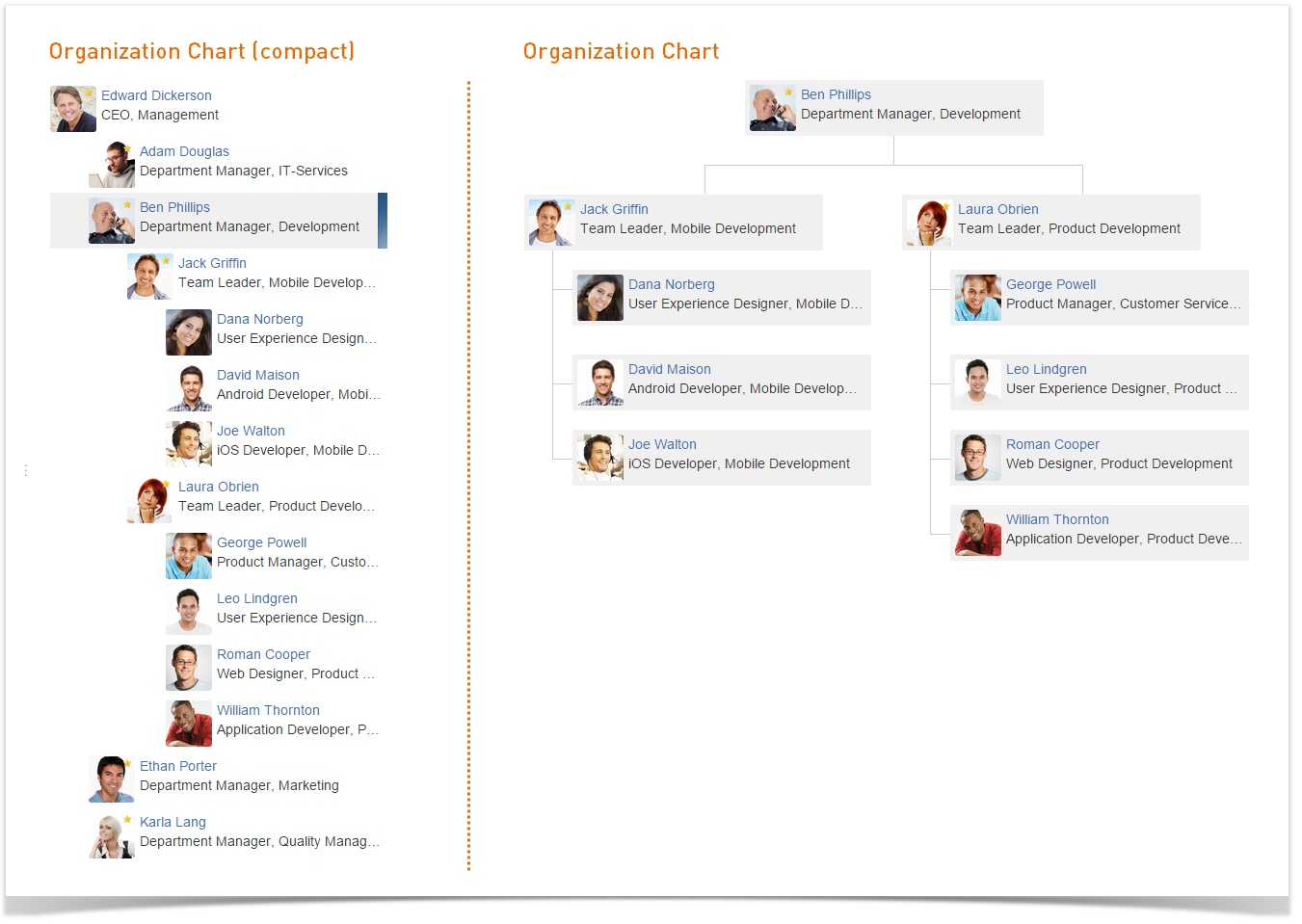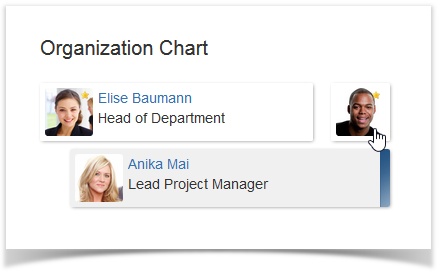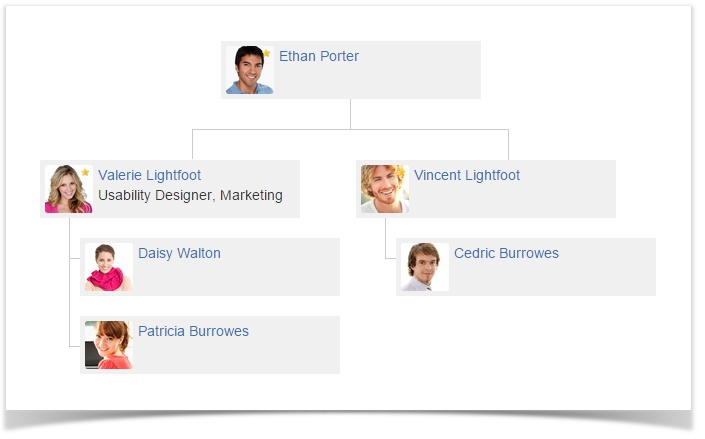Macros "Organization Chart" (v 3.4)
Enrico Schierz
Introduction
On this page you can find information how to use the Organization Chart macros. To make the macros work properly, you need to follow the instructions in the Organization Charts (v 3.4) configuration.
Data that is maintained in the user profiles can be used to build organizational charts.
The organization charts are always calculated on the basis of a particular reference user (This is configured by the Confluence Administrator.). That means starting from a particular user, the hierarchical relationships with superiors, colleagues and employees are visualized.
To display organization charts, you can use one of two macros: “Organization Chart (compact)” or “Organization Chart”. The charts are displayed for a certain reference user. The reference user is defined by their username.
User information in the Organization Charts
The following information (if available or maintained) will be shown for each user who is displayed in the organization chart:
- Profile picture
- Full name (including a link to the profile)
- Labeling superior (via a yellow star on the profile picture)
- A superior is marked with a yellow star on their profile picture. Therefore at least your personal superior has a star. If someone else of your colleagues is a superior, this person will also be marked with a star (as you can see on the screenshot). Please be aware that this star only appears within the org chart, and not on the general profile pictures.
- Position (field from the standard Confluence Profile)
- Department (field from the standard Confluence Profile)
- Highlighting the reference user (only "Organization Chart (compact)" macro)
Display Mode
SINCE VERSION 2.1
Starting with version 2.1 it is possible to choose between two different display modes. The first is named "minimal" and produces the information described above. The second is called "prioritized" and instead of only outputting the position and department, selected elements of the user profile, according to the configuration of the user profile elements (see “Visibility” in Configuration of Elements – Add and Edit) will be displayed. Additionally the email address is always shown in this mode.
Calculation of the Organization Charts
Please note that
- The organizational charts are calculated based on the data you entered in your user profile (one field of your profile, e.g. named “superior” is defined as basis for the hierarchy. All information about superiors, colleagues and employees is automatically calculated based on that field).
- It might take up to 45 minutes until changes to the superior are reflected in the organization chart hierarchy.

Image 1: Organization Chart (compact) and Organization Chart
Macro “Organization Chart (compact)”
Displays the organization chart for a specified user. The chart is “centered” around this user. This means that all parameters are evaluated relative to this user.
This chart is displayed on a profile page of the user – if configured.
Peers of the specified user are sorted alphabetically. The user will always be displayed first among their peers.
Secondary Manager
SINCE VERSION 1.12
Two managers can be displayed for the current user.
 Image 2: Organization Chart - Secondary Manager
Image 2: Organization Chart - Secondary Manager
To display name and position of the secondary manager, click on their profile image. To display the secondary manager's profile, click on their name afterwards.
Parameters
Parameter | Default | Values | Description | |
|---|---|---|---|---|
User | current user | optional | The user for whom the organization chart shall be displayed. If omitted, the user who is viewing the page containing the macro is used. | |
Levels of Parents | 1 | 0, 1 or 2 | Select how many levels of parents (= superiors) shall be displayed for the user in the hierarchy. If fewer levels of parents are available for the user, the extra levels will be ignored. | |
Levels of Children | 1 | 0, 1 or 2 | Select how many levels of children (= employees) shall be displayed for the user in the hierarchy. If fewer levels of children are available for the user, the extra levels will be ignored. | |
Display Peers | disabled | checkbox is enabled or disabled | Tick this checkbox if the user's peers (= colleagues) shall be displayed. | |
| Title | Organization Chart | optional | You can change the title of the org chart. | |
| Display Title | enabled | checkbox is enabled or disabled | If checked, a title is displayed above the org chart. | |
| Display Mode (since version 2.1) | minimal | minimal or prioritized | The mode defines which elements of the user profiles will be shown:
| |
Macro “Organization Chart”
This macro also displays organization charts for a certain user, but its purpose is to map larger structures (e.g. the company or department structure).
Please note: The structure shown is based on user profiles that are displayed.
The chart starts at the reference user and will display all hierarchy levels below this user. Connections on the same level or structural levels above the reference user are not displayed.
Parameters
Parameter | Default | Values | Description | |
|---|---|---|---|---|
User | current user | optional | The user for whom the organization chart shall be displayed. If omitted, the user who is viewing the page containing the macro is used. | |
Maximal level of Children | 1 | optional | greater than zero | Choose how many levels of children shall maximally be displayed for the user in the hierarchy relative to the root user above. If fewer levels of children are available for the user, the extra levels will be ignored. |
Display last level vertically | enabled | checkbox is enabled or disabled | Tick this checkbox if the last available level of users should be displayed in vertical orientation (one below the other). | |
| Display Mode (since version 2.1) | minimal | minimal or prioritized | The mode defines which elements of the user profiles will be shown:
| |

Image 3: Organization Chart
All Versions
- Release (v 3.5)
- Release (v 3.4)
- Release (v 3.3)
- Release (v 3.2)
- Release (v 3.1)
- Release (v 3.0)
- Release (v 2.1)
- Release (v 2.0)
- Release (v 1.12)
- Release (v 1.11)
- Release (v 1.10)
- Release (v 1.9)
- Release (v 1.8)
- Release (v 1.7)
- Release (v 1.6)
- Release (v 1.5)
- Release (v 1.4)
- Release (v 1.3)
- Release (v 1.2)
- Release (v 1.1)